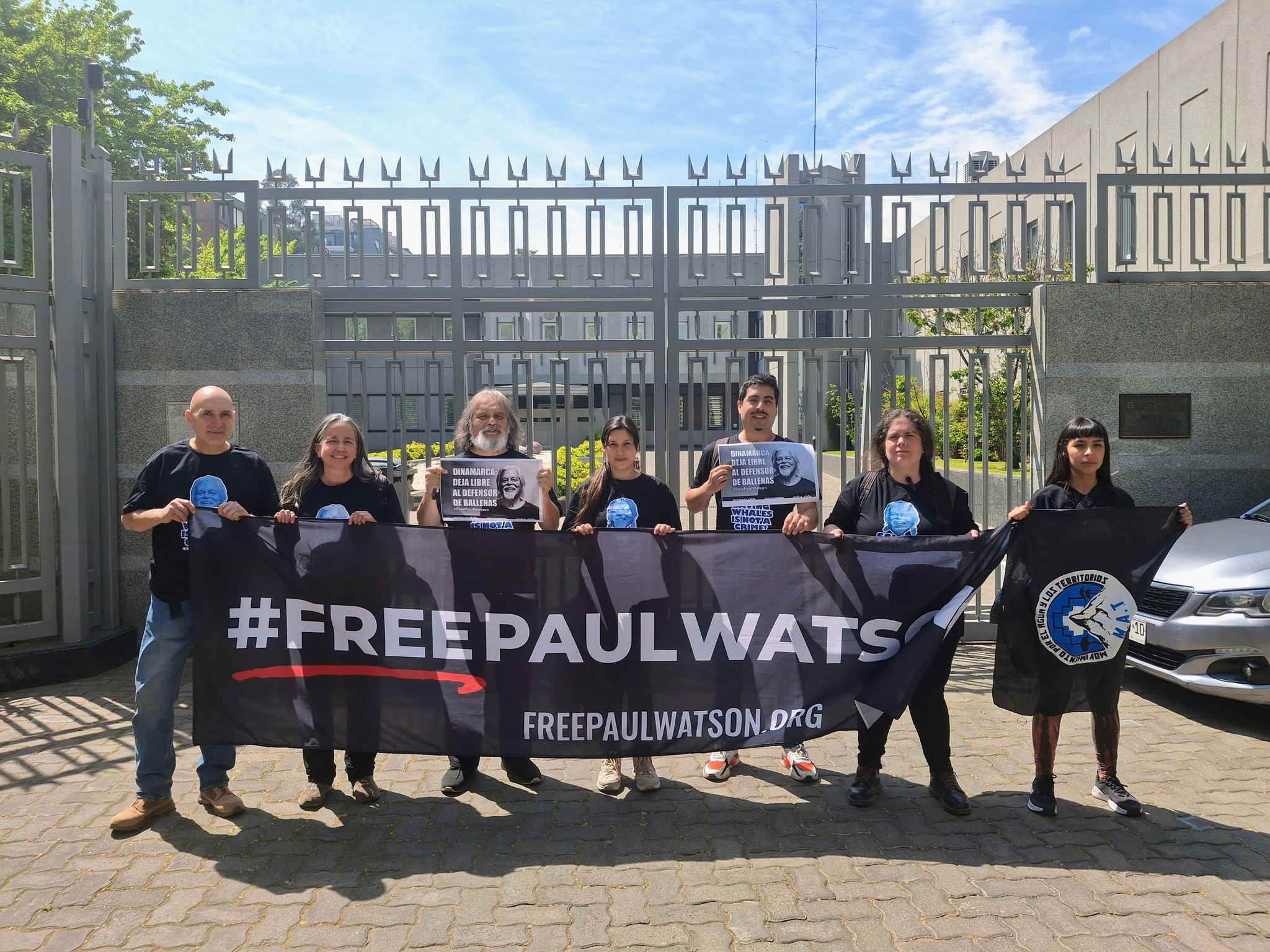- From Chile, communities, socio-environmental organizations, and artists extended a heartfelt embrace of freedom.
- Millions of citizens are celebrating this triumph of resistance against abuse and environmental destruction.
- The coalition of socio-environmental organizations, human rights advocates, artists, and local communities that supported the international campaign for the release of anti-whaling activist Paul Watson stated that his release “constitutes a strategic defeat for those who, globally and in Chile, aim to criminalize and silence defenders of the environment and whales.”
Santiago de Chile, December 17, 2024. (original article published in radiodelmar.cl) — Denmark has decided not to extradite environmental defender and anti-whaling activist Paul Watson to Japan after he was imprisoned in Greenland since July 15. Watson had been arrested pursuant to a request from Japanese authorities, who accused him of throwing a foul-smelling bottle at a whaling ship, allegedly injuring one of its crew members—a claim that was never proven.
Ecoceanos, one of the socio-environmental organizations that formed a collaborative campaign in Chile to support Watson’s release, noted that “the Danish government’s decision represents a strategic defeat for Japan in its attempt to resume its destructive whaling operations in the Pacific, Southern Ocean, and Antarctica, as well as a victory for defenders who are actively fighting against the destruction of our seas and their biodiversity.”
Juan Carlos Cárdenas, a veterinarian and director of Ecoceanos in Chile, stated, “Our fight to defend the whales continues. The release of Paul Watson demonstrates the power of collaborative participation and organized citizen pressure that brought together socio-environmental defenders, human rights advocates, local communities, poets, and artists in defense of life, against efforts to intimidate and silence activists protecting the environment.”
Cárdenas emphasized that “in Chile, the mega salmon farming industry should take note of this turning point in socio-environmental resistance, as it seeks to criminalize and silence environmental organizations, human rights groups, and Indigenous communities through a dark and corrupt bill presented in parliament.”
Elsa Cabrera, director of the Cetacean Conservation Center (CCC), told radiodelmar.cl, “The Danish justice system’s rejection of the extradition request from the Japanese government not only reflects the global outcry demanding Paul Watson’s release but also unveils the Japanese government’s intention to intimidate and silence defenders of whales and biodiversity.”
Cabrera added, “This attempt to perpetuate and expand illegal whaling into international waters in the Southern Hemisphere is unacceptable. It is essential that we continue working together to ensure such abuses do not happen again in the future.”
Francisca Fernández Droguett, a member of the Water and Territories Movement, expressed, “Today, we are filled with joy to learn of Denmark’s decision to release Paul Watson and not extradite him to Japan. However, this case reminds us of the ongoing persecution, criminalization, and judicial harassment faced by defenders of nature and animals, as exemplified by Julia Chuñil, a Mapuche woman who remains missing.”
Julia Chuñil is a defender of native forests and the rights of her community in Máfil (Chile), facing continuous threats from the forestry industry. “Today, she is missing in the context of territorial defense against the devastation and appropriation of her territory by an agro-industry. We feel it is urgent to continuously denounce the situation faced by biodiversity defenders while also celebrating this milestone of Captain Paul Watson’s release. However, in celebrating, we remain aware that the fight for dignity, justice, and the defense of life and territories continues,” stated Fernández.
Lucio Cuenca, director of the Latin American Observatory of Environmental Conflicts (OLCA), remarked, “The freedom of Paul Watson is a triumph of international mobilization involving coastal communities, activists, and the global socio-environmental movement. It is a triumph of international citizen awareness regarding the decades-long struggle that Paul and his companions have undertaken to defend the oceans and whales against Japan’s ecocidal policies.”
“The Danish Ministry of Justice, by choosing not to heed Japan’s extradition request for Paul Watson, responds to the tremendous international citizen pressure and acknowledges the injustice of Japan’s demands. Japan’s whaling policy continues amidst a profound global climate and ecological crisis, hence the movement for oceans and whales is a present-day task that must be strengthened for the future in the interest of the planet’s common good and ecological justice.”



